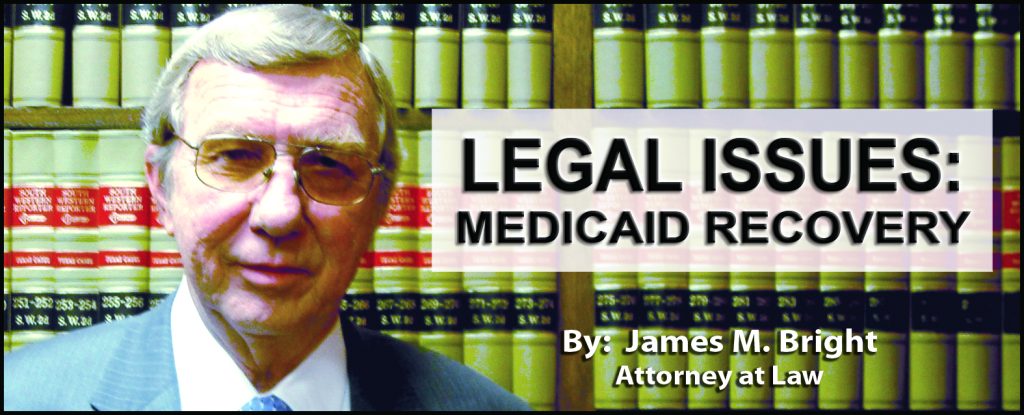The following is provided for informational purposes only and is not, nor should it be construed as legal advice.
This firm is often faced with questions during probate proceedings regarding how the Medicaid Estate Recovery Program affects the disposition of property belonging to an estate. Although this program affects only a small number of probate clients, it can be troublesome. If benefits have been paid to the decedent, and the probate estate is the owner of the family home and the children have an expectation of inheritance from the sale of the home, there is a great possibility of conflict.
When qualifying for Medicaid, the person applying must show financial necessity for care. When computing this financial need, the State of Texas ignores the value of the homestead property. The assumption is that the Medicaid applicant may return to their home after the need for Medicaid services is no longer required. This is the case, no matter how long the recipient receives services in the nursing home, care facility or by other means.
The Medicaid Estate Recovery Program, normally referred to as “MERP,” is a federal program which Texas and all other states are mandated to implement. It is a program for recovery of expenditures made by the State of Texas for long-term care health/nursing home benefits which have previously been paid by the state. The funds so collected will be put back in the system to pay for future Medicaid benefits for other persons seeking long-term care services.
One of the first questions that must be answered before we can determine how MERP affects distribution of probate assets includes: Was the recipient of Medicaid services 55 years of age or older when the long-term nursing care or other services were performed, or did the recipient apply for long-term care services on or after March 1, 2005?
If the Medicaid recipient applied for services prior to March 1, 2005, and subsequently received benefits, they are “grandfathered” into the system, and the estate will never be liable for reimbursement of benefits received.
If, on the other hand, the Medicaid recipient applied for or received services on or after March 1, 2005, his/her estate may be liable for services provided.
Common Medicaid questions that come up when probating a Will include:
• What is included in an estate that can be reached by MERP? The answer to that question will include all real and personal property that is subject to probate. The most effective way of answering this question is to define which assets, if any, do not pass through the probate estate. A non-exclusive list of these assets can be insurance proceeds, retirement accounts, pension plans, deposit accounts that carry a payable on death (POD) designation or right of survivorship plan designation.
• What are the exceptions, if any, from MERP claims? According to Texas Department of Aging and Disability Services (DADS), if any of the following conditions exist, the MERP claim will not be filed:
• There is a surviving spouse;
• There is a surviving child or children under 21 years of age;
• There is a surviving child or children of any age who is blind or has a permanent or total disability under Social Security requirements;
• There is an unmarried adult child residing continuously in the Medicaid recipient’s homestead for at least one year before the time of the Medicaid recipient’s death.
Further, according to published information from DADS, they will only file a claim if it is cost effective. Claims that have been considered to be not cost effective include those instances wherein:
• The value of the recoverable estate is $10,000 or less; (See the above non-exclusive list of assets that have historically been safe from recovery.)
• The recoverable amount of Medicaid costs is $3,000 or less; or
• The cost of the sale of the property would be equal to or greater than the value of the property.
Another common question is how far does the Internal Revenue Service “look back” for transfer of property? The period of time for an IRS “look back” is normally sixty (60) months. If the Medicaid recipient’s plan is to avoid MERP claim requirements, it should be done well in advance of need.
It is also worthy of note that when the State of Texas holds a lien on real property of a decedent that is responsible for Medicaid debt, it does so only to the extent of the debt. This may result in the State being reimbursed and the heirs still receiving their inheritance. Example: If the Medicaid debt is $30,000 and the old homestead is worth $120,000, the State will be reimbursed and the heirs will still inherit $90,000.00.
The information made available in this article is also available through the Texas Health and Human Services Commission and the Texas Department of Aging and Disability Services. Publications from those offices are directly or indirectly the source of most of the information contained in this article.
As always, if you have questions relating to any area of probate law, you should seek advice from an attorney of your choice that has demonstrated expertise in probate matters.
James Bright has been admitted to practice before the Federal Courts for the Southern District of Texas and Eastern District of Texas as well as all of the Justice Courts, Probate Courts, County Courts at Law, District Courts, Courts of Appeal and Supreme Court for the State of Texas. He maintains an office in Houston and by appointment, another at 208 McCown Street in the heart of historic Montgomery. Contact may be made by telephone (936) 449-4455 or (281) 586-8277. For more information about wills or probate in Texas, please see- www.houstontxprobate.com.
IF YOU WISH TO SUGGEST A TOPIC FOR THIS COLUMN, SEND TO: JAMES M. BRIGHT 14340 TORREY CHASE BLVD., SUITE 150 HOUSTON, TEXAS 77014 Email: topics@houstontxprobate.com
